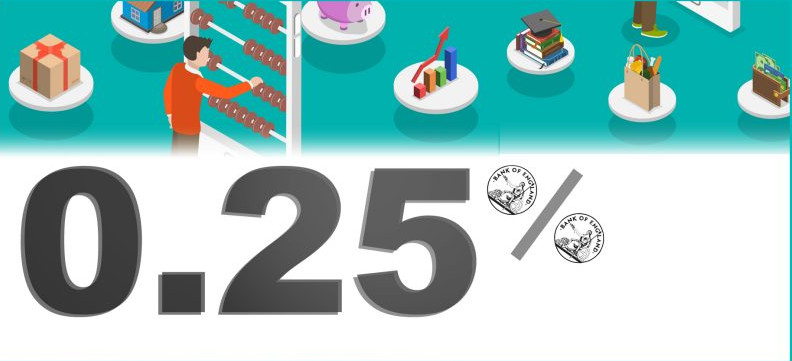
Home | Insights | UK | Rising UK interest rates and your Personal Finances
Rising UK interest rates and your Personal Finances
Posted on: 9th November 2017 in
UK
The Bank of England’s Monetary Policy Committee last week announced it would raise its base interest rate – the first hike in more than a decade. What does this mean for you? The Bank rate has now been raised by 0.25% to 0.5%. The decision has big personal finance implications for both British residents and expatriates! Can you take this rate rise in your stride?
Mortgages
Holders of UK tracker mortgages will be paying more, with most of the big lenders already committed to boosting their own rates on December 1st, 2017. Some standard variable rate mortgages will be affected. Key considerations to discuss with your IFA:
- If you’re a UK mortgager, how much has the rise in interest rates increased your monthly repayments? How does it change you monthly budgeting – will you have to make some cutbacks or draw on savings?
- If you have a savings plan, you may want to start saving a little less to cover the increase in mortgage payment. But how will this affect the target for the savings plan that you and your adviser established for the start? A time perhaps, to crunch the numbers with your adviser …
- If you’ve been building a nest egg of general savings, could now be a good time to pay down a bigger chunk of the mortgage than usual before further rate rises?
Pound sterling
Interest rate rises usually result in a strengthening of the currency. Why? Well, it is complicated: when interest rates rise, banks tend to raise the interest they are prepared to pay out on their products, which means savers and companies are therefore more likely to stow away cash in banks in the short term, therefore taking money out of the economy, reducing the supply of the currency and therefore increasing its value. But last week’s announcement actually saw a dip in the value of sterling! This is because bank officials said they were in ‘no hurry’ to raise rates again. In other words, not too much currency will be out of the economy in the near future, putting a lid on immediate rise on sterling’s value. Nevertheless, it’s a fair bet the pound will overall strengthen in the coming months – particularly if central banks of the other major economies (remember, the value of a currency is only relative to others) don’t raise their rates. What does this mean for you? Are you transferring more money from dirhams to pounds to gain from this near-term increase in value of the latter? What bank or foreign exchange platform are you using to make this most efficient?
Bonds
Bonds may be of interest to you as a means of diversifying your investment portfolio. UK government government bonds are also known as ‘gilts’. Interest rate rises are bad for bonds, and particularly impacted are long-dated bonds – those bonds with more than five years before maturity. The interest rates on long dated bonds are a consideration of mortgage lenders when they set their rates.
Pensions
If you’ve got an annuity, your income might change as a result of the interest rate change. Here’s why: The returns on gilts affect the drawdown on pension annuities. With an annuity, the amount received each month in retirement is determined by the Government Actuary’s Department (GAD). So-called GAD rates are based on a formula relating to the interest rates on gilts. Speak to your IFA to see how your annuity will be affected.
Inflation
Inflation should theoretically come down as a result of the rate rise. An interest rate rise should reduce inflation by taking cash out of the economy and so capping the rise in prices of goods. Inflation is a key factor to keep an eye on in your own financial planning – because if you don’t get an investment return that beats inflation, you’re in trouble.
Conclusion
Bank of England Governor Mark Carney has said that the ‘novelty’ of the first rate rise in a decade might lead to some short-term uncertainty. How will this uncertainty affect you? Will your monthly expenditure or budgeting have to change? Are there better mortgage rates to which you could refinance; could the portfolio in your savings plan or offshore pension require review? What is certain is that credit cards will continue to get more expensive as a result of the interest rate hike – and clearing any credit cards debts should therefore remain a priority.


















